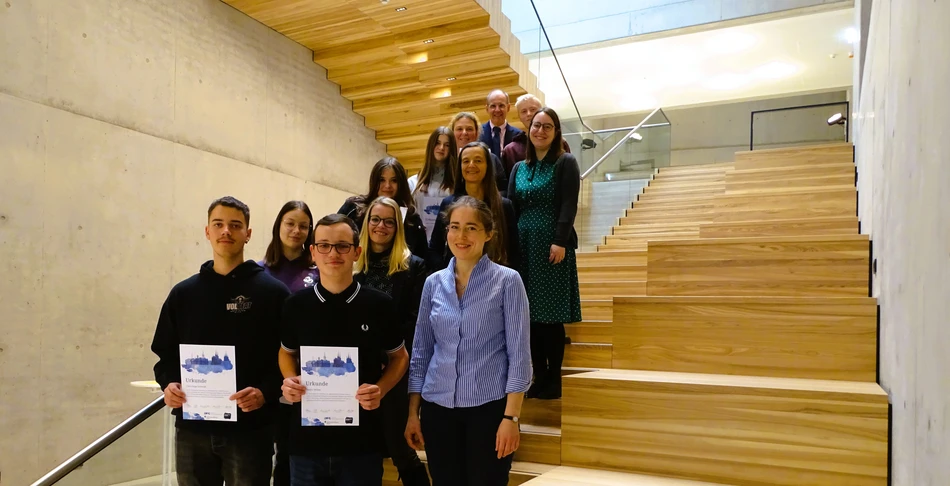With their podcast on the Jewish history of the city of Schmalkalden, they won over the jury of the "City and Religion" competition, which was launched last year by the "Religion and Urbanity" (FOR 2779) research group at the University of Erfurt: Desiree Kössel, Mattis Möller, Larissa Ashley Petri, Lion-Hugo Schmidt, Justin Schneider, Jolina Schreiber and Franz Stadler - pupils* from two ninth-grade classes at the Floh-Seligenthal state regular school.
The students were invited to the award ceremony on 16.11.2023 in the new "World Relations" research building on the campus of the University of Erfurt. After a ceremonial welcome to the school class by Susanne Rau, Professor of the History and Cultures of Spaces in Modern Times at the University of Erfurt, and Simone Wagner, PhD student at the Max-Weber-Kolleg of the University of Erfurt, who had initiated the competition, the certificates were ceremoniously presented during the annual conference of the collegiate research group "Religion and Urbanity".
With the aim of strengthening enthusiasm for the humanities, the competition was designed to encourage pupils to explore their city from the perspective of different subjects and their interactions with the religions that live there and influence them.
"Your competition entry on the Jewish history of Schmalkalden makes it particularly clear how important the topic of 'religion and the city' is," emphasized Susanne Rau. "The question of the social significance of religions is more topical than ever. Our everyday view is clouded by violent conflicts that are waged with reference to religious affiliations. Something is sometimes lost in this news, namely that violent conflicts are often preceded by years of peaceful coexistence. This tension also becomes clear in your article on the Jewish history of the town of Schmalkalden. In the history of Schmalkalden, the Jewish community was sometimes forcibly expelled by the authorities, i.e. the secular power, but was then able to resettle before it was almost completely wiped out during the Third Reich. The tension between the existence of religious diversity and the attempt to create uniformity is particularly evident in cities. The relationship between the city and religion exists because certain places in cities are associated with the Jewish or other religions and at the same time are part of a larger spatial whole. You have demonstrated this beautifully with the synagogue and the mikvah in Schmalkalden."
The podcast was published on the research blog of the research group "Religion and Urbanity" and can be listened to at this link.
A small gift and a tour of the new research building sealed the event. Prize money was generously provided by the Sparkassenstiftung Erfurt and sent to the school for the winning students.
Further links:
Link to blogpost: Award ceremony for the "City and Religion" school competition
Link to blogpost: Winners of the "City and Religion" school competition
Link to blogpost: Competition for pupils on "City and religion"

